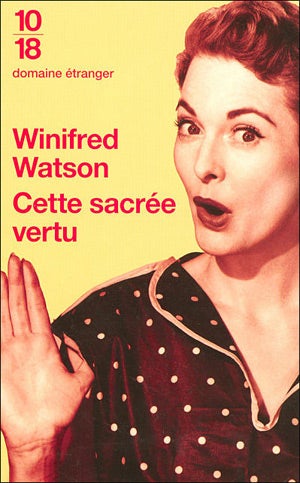Forgotten Authors No.45: Winifred Watson

Your support helps us to tell the story
From reproductive rights to climate change to Big Tech, The Independent is on the ground when the story is developing. Whether it's investigating the financials of Elon Musk's pro-Trump PAC or producing our latest documentary, 'The A Word', which shines a light on the American women fighting for reproductive rights, we know how important it is to parse out the facts from the messaging.
At such a critical moment in US history, we need reporters on the ground. Your donation allows us to keep sending journalists to speak to both sides of the story.
The Independent is trusted by Americans across the entire political spectrum. And unlike many other quality news outlets, we choose not to lock Americans out of our reporting and analysis with paywalls. We believe quality journalism should be available to everyone, paid for by those who can afford it.
Your support makes all the difference.When it comes to literary success, timing is everything. Before JK Rowling's boy wizard there had been a virtual industry of magic-schoolboy tales, but Harry Potter was the one that clicked. Winifred Watson's literary career was curtailed by three major events; the depression, the attack on Pearl Harbor and the Blitz.
Watson was born in 1906 in Newcastle upon Tyne, and remained there all her life. Due to follow her sisters into higher education, she found the way blocked when her father's shoe shops failed in the Depression of 1929. She wrote her first book, the Northumbrian historical drama Fell Top, in dull days stuck behind a secretarial desk, after her boss suggested bringing in knitting to keep herself amused. Finishing it in six weeks, she stuck it in a drawer and forgot about it until she spotted an advert from Methuen looking for new writers. The novel was critically well-received and became a radio play. Watson was young and pretty, and got local coverage, so the publishers asked her for more. The result was Odd Shoes, produced in a different style that benefited from proper research.
Her third book horrified Methuen. Instead of being serious, it was fun, and she was writing on subjects she knew nothing about. The book was Miss Pettigrew Lives for a Day, about a frumpy governess who is accidentally sent by her agency to work for a louche actress and nightclub singer running a complicated love life. Watson said: "I didn't know anyone like Miss Pettigrew. I just made it all up. I haven't the faintest idea what governesses really do. I've never been to a nightclub and I certainly didn't know anyone who took cocaine."
The book was an immediate hit, and a Hollywood musical was planned starring Billie Burke, the good witch from The Wizard Of Oz. The bombing of Pearl Harbor put paid to that. "I wish the Japanese had waited six months," she said later.
Watson married and wrote every day, but when the house next door was blown up in the war, her family was forced to move into one room with her parents, making writing impossible.
Persephone Books persevered with the republication of Miss Pettigrew, and the book found its way on to Hollywood desks once more. A rather charming film version starring Frances McDormand and Amy Adams finally appeared in 2008, six years after Watson's death.
Join our commenting forum
Join thought-provoking conversations, follow other Independent readers and see their replies
Comments